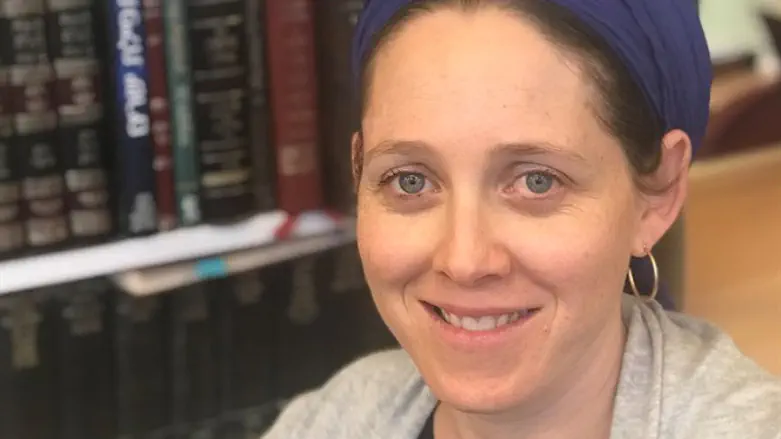
The publication of Rabbanit Chamutal Shoval’s article in the latest volume of Tchumin (vol. 39) may sound like a trivial fact. However, it is in fact a change in approach for the venerable halakhic journal, which has enabled a woman to contribute a halakhic article, in a rare move, under her own name and without the addition of a male author. Although over the years a number of articles written by women have been published, the author’s name rarely appeared on its own, as Tchumin wanted to include articles from contributing Haredi rabbis as well.
Rabbanit Chamutal Shoval, a third-year fellow at Ohr Torah Stone’s Susi Bradfield Women’s Institute of Halakhic Leadership (WIHL) at Midreshet Lindenbaum, had her article published in the new volume. Shoval, who studied at OTS’s Midreshet Lindenbaum after completing her National Service, also holds a bachelor’s in psychology, is a graduate of the prestigious Amirim program at the Hebrew University and has a master’s in New Media.
In her article, Rabbanit Shoval seeks to reintroduce the concept of “Gdol Habayit” (“the most important member of the household”) in the laws of mourning. When a family sits shiva, the number of days for sitting is reckoned jointly for all family members – even if one of them was abroad at the time, or heard about the death at a later date. According to Shoval’s article, the “most important male (or female) member of the household” are the ones who determine the shiva’s length; if someone arrives from abroad, he joins the family members already sitting shiva, even though he may end up sitting for fewer than seven days. The concept of “Gdol HaBayit” is important, because its intention is to reunite the family at a time of loss.
Rabbi Menachem Perl, head of the Zomet Institute said: “The gates of the Tchumin beit midrash are open to any significant halakhic article written by a God-fearing person; man or woman. We are gratified by the widening of the circle of those engaging in halakhic writing, men and women. That said, the editorial considerations relate to the essence of the article.”
Ohr Torah Stone’s WIHL runs an unparalleled five-year program which includes an in-depth and comprehensive study of halakha at the highest and most encompassing levels and trains women to give halakhic rulings and to be spiritual leaders of communities and educational institutions. WIHL fellows study halakha on the high levels required in order to rule but additionally take courses in leadership, pastoral work, how to interact with individuals and the community, as well as studies in understanding media, assisting male and female victims of sexual abuse, practical halakhic rulings on issues dealing with the family, and more.
Rabbanit Chamutal Shoval is gratified to be the first woman to publish an article under Tchumin’s new policy: “I am pleased to have been given the opportunity to publish a halakhic article in the new volume of Tchumin. The article deals with the way to unite a mourning family during the period of shiva through an analysis of the figure representing the “Gdol Habayit” – “the most important member of the household.” I sincerely hope that more women will join the world of halakhic writing and that additional journals will follow Tchumin in allowing women to publish halakhic articles.”
Rabbanit Devorah Evron, director of Ohr Torah Stone’s Susi Bradfield Women’s Institute of Halakhic Leadership (WIHL): “Chamutal is a role model for the WIHL fellows, women who are becoming halakhic leaders and proving they are able to hold important leadership positions and publish halakhic articles in the most prestigious journals in the Torah world. We are proud that this article had its beginnings in the WIHL and we congratulate Chamutal as well as Tchumin on opening its doors and publishing her article in the leading journal of the halakhic and Jewish world.”
Rabbi Dr. Kenneth Brander, President and Rosh HaYeshiva of Ohr Torah Stone: “Our commitment to the Halakhic framework guides our aspirations to enable women to serve as Torah personalities continuing the legacy of Devorah the Prophetess. we wish to add a unique light increasing the illumination of Torah to all our people which is done by contributing to illustrious publications like Tchumin. We are in their debt for opening up the publication to both men and women of great halakhic stature.”